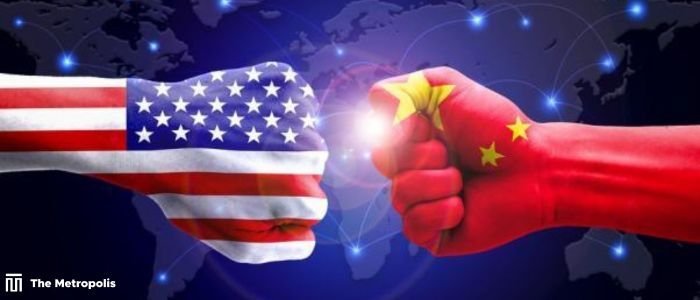Simon Mohsin –
The global landscape is witnessing shifts that are both overwhelmingly concerning and nerve-wracking; and at the forefront are the Gaza issue, and the US-China issue. US President Biden and Chinese President Xi Jinping met at the Asia-Pacific Economic Cooperation event. The meeting came amid efforts of high-level communication between the two giants. The meeting discussed curbing fentanyl flows into the U.S., safe use of artificial intelligence, and American restrictions on Chinese access to high-end tech. China and the US’ interactions, negotiations, and engagements influence the very fabric of global geopolitics as well as their bilateral relations, and global trade. There is a dire need for a cooperative China-US relationship for global stability; however, overcoming the plethora of differences these two Goliaths have is a monumental task.
The outcome of the meeting was not exceptionally remarkable, but it has been a significant development since the tensions that have prevailed between the two, especially with the issue of Taiwan remaining a key irritant for the US, and an acceptable point of negotiation for China. There are several issues of contention between the two that include but are not limited to espionage, intellectual property theft, human rights abuses, foreign interference, and trade penalties, as well as the sensitive matter of Taiwan. Another key issue of contention for the US is the fentanyl shipments. The leaders announced an agreement to stop illicit exports of chemicals from China. These chemicals can be used to make the drug that has led to the overdose deaths of hundreds of thousands of Americans. They also agreed to re-open communication channels at both military and civilian levels. This is likely a crucial step in improving China-U.S. relations. It might serve as a foundation to lay the groundwork for addressing broader challenges in the future.
Although these developments signify some notable improvements, Analysts say that core differences remain between them. Biden and Xi failed to reach an agreement on new restrictions on the use of AI in nuclear weapons control systems. There were also no substantive new agreements on the Taiwan issue. Also, China and the US are on opposing sides in ongoing global conflicts. China is backing Russia in its war in Ukraine and the US Kyiv, China offering support for Palestinians amid the Israel-Hamas war, and the US backing Israel’s attacks on Gaza. Also in the South China Sea, a region where China has sought to establish its dominance, the US is in disagreement with China’s objectives in the region. Also, only hours after the meeting, Biden described the Chinese leader as a “dictator” to reporters, sparking a furious response from China. Their competition spans many facets of geopolitics including military, economic, and technological domains. The situation has risen to a new cold war that is both the same and different from the previous cold war between Russia and the US. China is intricately involved in the US economic order, contrary to the Soviet Union. China’s active participation in the global economic order has transformed the dynamics of the current geopolitical landscape. The economic interdependence between the U.S. and China sets this rivalry apart. China relies on the US market for its product sales, while the US depends on China for financial transactions. Also, people-to-people connections between the two countries are remarkable; the likes never existed between the Soviets and the US. With a 5.4 million-strong Chinese diaspora in the U.S. and 300,000 Chinese students studying in American universities. These make the confrontations between the two more difficult.
The recent meeting between the two leaders carried immense significance. The two leaders of the world’s largest economies tried to establish a sense of stability following a challenging year in U.S.-China relations. Both leaders expressed their keen interest in stabilizing, but the meeting did not bring any transformative change but rather created an amicable environment for future interactions. This truly underscores American political scientist Joseph Nye coined the term “cooperative” for characterizing China-US relations. The challenges of our globalized world — including climate change, pandemics, artificial intelligence, economic volatility, and human security — necessitate active Chinese participation. These challenges make it particularly important that the U.S. and China stabilize relations.
Simon Mohsin is a Political and International Affairs Analyst



